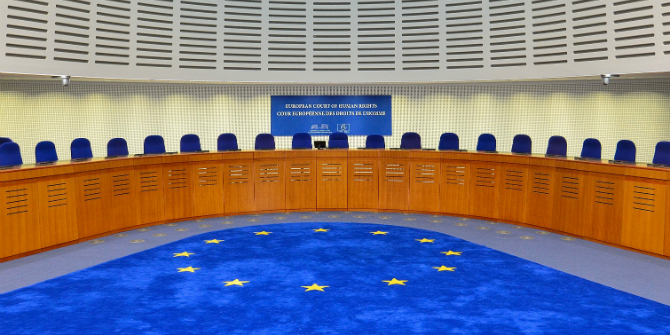Imminent departure from the European Union has delayed but not dimmed the British government’s determination to be done with domestic human rights law. LSE’s Conor Gearty writes on the future of human rights in the UK following Brexit. He concludes that the UK will have to withdraw from the Human Rights Convention if it wants to deport EU citizens.
Enacted in the early years of the Blair administration, the Human Rights Act 1998 has long irritated the Conservative Party and its influential friends. The right-wing media hate it for equipping celebrities (and of course everyone else) with a right to respect for their privacy with which to fight press intrusion. The senior military deplore it because it insists on proper inquiry into bad behaviour in a way that they say diminishes the country’s capacity to fight. And it has been a perennial punch bag at Tory party conference, for standing in the way of tough action on terrorism and immigration, by the current Prime Minister in the past, and the current Lord Chancellor and Secretary of State for Defence in the present. It is the recent attack on immigration launched by the Home Secretary Amber Rudd at the most recent Tory conference that makes the Act particularly vulnerable in the context of the move to Brexit.
The Government has been clear that resident European citizens have no right to regard the UK as their guaranteed home in the aftermath of the UK’s exit from the EU. Of course there is a hope that they will be able to stay in the country, an expectation even, but this depends on the outcome of discussions between Britain and the rest of the EU. In the cold words of the Secretary of State for International Trade, Liam Fox, such persons are one of the “main cards” available to him and his colleagues in the months of negotiation that lie ahead. To make this threat real, the Government will need either to repeal or sharply to modify the Human Rights Act, or indicate in an unequivocal way that any rulings issued under it that seek to inhibit the forced deportation of Europeans will be disregarded.
The Government has been clear that resident European citizens have no right to regard the UK as their guaranteed home in the aftermath of the UK’s exit from the EU
Article 8(1) of the European Convention on Human Rights guarantees among other things respect for family life and this was one of the rights made part of UK law by the Human Rights Act. The case-law under the Act (and at the European Court of Human Rights in Strasbourg) makes clear that forced expulsion of residents attracts the protection of this provision, and in the drastic example of Brexit there would be little doubt that the courts would not be willing to save such actions by reference to the reasonably tightly drawn exceptions to the right that are set out in Article 8(2). The explicit discrimination on the basis of nationality would also most certainly attract the attentions of Article 14, on non-discrimination in the enjoyment of these Convention rights.
The Human Rights Act would stop all government discretionary power designed to make a reality of such deportations and would also lead the courts quickly to declare primary legislation designed with these expulsions in mind to be incompatible with the Convention. These later declarations are not binding on the government (an important concession to parliamentary sovereignty in the Human Rights Act) but that would not stop the Strasbourg Court finding a breach when the matter came before it. So to be free to talk tough, to make the millions of Irish, French, Poles and so on living in Europe, effective bargaining chips, Mr Fox and his friends will need to escalate the bluff by creating conditions on the ground for it to be carried out if it has to be, not only repeal/modification of the Human Rights Act but – contra the Prime Minister’s promise during her brief campaign for the leadership – withdrawal from the Convention system as well. European residents will become like nuclear warheads, primed to be fired at any moment in the hope that they never will be.
This may seem a dark scenario, too awful to be taken seriously, like a hard border returning in Ireland or (starved of foreign students) the collapse of the UK’s universities as major intellectual resources. But such conversations are inevitable if the logic of Brexit is to be taken seriously. Whether that logic can triumph against market power, the global rights movement, and basic human decency remains to be seen.
This post represents the views of the author and not those of the Brexit blog, nor the LSE. It was first published on the OUP blog. Photo by Adrian Grycuk: image credit (CC BY-SA 3.0).
Conor Gearty is Professor of Human Rights and Director of the Institute of Public Affairs and the London School of Economics. He is the author of On Fantasy Island: Britain, Europe, and Human Rights (OUP, 2016).









The press are reporting that the appropriately named Paul Nuttal,l who looks likely to be the new UKIP leader, will be campaigning for a referendum to introduce the death penalty.
I am not a lawyer but I’m fairly sure this would also involve scrapping the Human Rights Act.
As a German citizen who has lived in the UK for 30 years, is married to a British citizen and working as a university lecturer in the UK I am very concerned about recent reports of fellow EU academics being told to “go home”. There is a petition to urge parliament to guarantee EU citizens’ rights following Brexit on the parliament petitions’ website which has worryingly few signatures and needs to get up to at least 100,000 in order for parliament to debate the issue.
I would be very grateful if anyone who feels strongly about this could sign and forward to others. Thank you.
https://petition.parliament.uk/petitions/177916